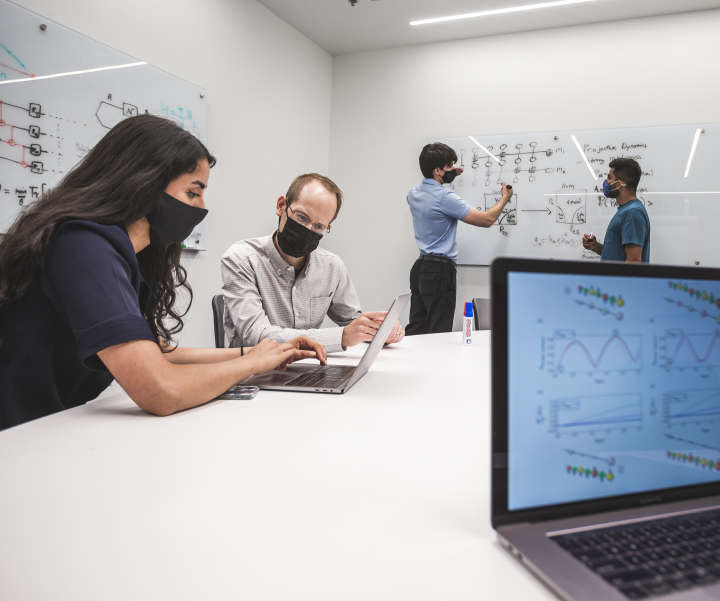UMD Leads New $25M NSF Quantum Leap Challenge Institute for Robust Quantum Simulation
The University of Maryland has been tapped to lead a multi-institutional effort supported by the National Science Foundation (NSF) that is focused on developing quantum simulation devices that can understand, and thereby exploit, the rich behavior of complex quantum systems.
The NSF Quantum Leap Challenge Institute for Robust Quantum Simulation announced on September 2, 2021, brings together computer scientists, engineers and physicists from five academic institutions and the federal government. Funded by a $25 million award from NSF, researchers in the UMD-led institute will develop theoretical concepts, design innovative hardware, and provide education and training for a suite of novel simulation devices that can predict and understand quantum phenomena.
“Maintaining and growing our global leadership in quantum science and technology is important for the state of Maryland and a top strategic priority for its flagship campus, the University of Maryland,” said UMD President Darryll J. Pines. “The Quantum Leap Challenge Institute for Robust Quantum Simulation positions us to tackle grand challenges in quantum information science and quantum computing, and it further elevates our region as the Capital of Quantum.”
Quantum simulation is a fundamental step toward realizing a world where general-purpose quantum computers can transform medicine, break encryption and revolutionize communications. Even the most powerful of today’s “classical” computers struggle to represent even relatively small quantum systems, an obstacle that could be overcome by building next-generation quantum simulators.
Andrew Childs, a UMD professor of computer science and co-director of the Joint Center for Quantum Information and Computer Science (QuICS), is the lead principal investigator of the NSF award and will serve as director of the new institute.
“Quantum simulation is arguably the most compelling application of quantum computers,” Childs said. “Through dedicated research, education and outreach, we will nurture the quantum simulation community and provide a sharp focus on new discoveries and applications involving quantum simulation.”
In addition to faculty, postdocs and students from UMD, the NSF Quantum Leap Challenge Institute for Robust Quantum Simulation will include quantum experts from Duke University, Princeton University, North Carolina State University and Yale University, as well as researchers from the National Institute of Standards and Technology (NIST). Nine of these federal scientists are already embedded on the UMD campus, working in the Joint Quantum Institute, launched in 2006, and in QuICS, launched in 2015.
In addition to Childs, leadership roles in the NSF Quantum Leap Challenge Institute for Robust Quantum Simulation will be filled by Ian Spielman from NIST (associate director for research), Mohammad Hafezi from UMD (associate director for education), Gretchen Campbell from NIST (associate director for diversity and inclusion), as well as co-principal investigators Kenneth Brown and Christopher Monroe (Duke), Alicia Kollár (UMD) and Jeff Thompson (Princeton).
“Our strength in quantum science research and our connections with academic and government collaborators give us a solid foundation on which to build this newest quantum endeavor,” said Amitabh Varshney, dean of UMD’s College of Computer, Mathematical, and Natural Sciences, where the new institute will be administratively housed. “The NSF Quantum Leap Challenge Institute for Robust Quantum Simulation represents scientific discovery and impact at its best—taking on the most difficult of challenges and using the knowledge gained to transition to a quantum-based economy that can improve people’s lives significantly.”
The researchers believe that by evaluating the best approaches to small-scale quantum simulation, they can provide a detailed blueprint for what could be early practical applications for quantum computers. They have identified three major scientific challenges to focus their efforts on: methods for verifying the correctness of simulations, the interaction of simulators with their environments, and the development of scalable quantum simulators for science and technology applications.
To do this, the researchers plan to explore the theoretical foundations of quantum algorithms and error correction—in conjunction with experimental implementations of reconfigurable quantum simulators—on four leading hardware platforms: trapped ions, arrays of Rydberg atoms, quantum photonics with solid-state defects and superconducting circuits.
They envision tight collaboration between theoretical and experimental approaches to co-design near-term simulation protocols with current and next-generation devices. This includes the joint development of optical and microwave control techniques across different experimental platforms, allowing for rapid advances in system size and controllability.
The ongoing mission of the NSF Quantum Leap Challenge Institute for Robust Quantum Simulation will also include a strong educational component. Plans call for a new flagship conference on quantum simulation and other outreach and education programs that engage diverse groups of students in quantum science, including partnerships with Morgan State University and North Carolina Central University.
Faculty in the new institute also plan to introduce cross-disciplinary undergraduate specializations in quantum information and provide quantum information training for postgraduates and professionals.
Today’s announcement is the latest in a series of federal grants establishing a cohort of Quantum Leap Challenge Institutes nationwide. Three Quantum Leap Challenge Institutes launched last year, with the Quantum Leap Challenge Institute for Robust Quantum Simulation and the Quantum Leap Challenge Institute for Quantum Sensing in Biophysics and Bioengineering—led by the University of Chicago—being funded in 2021.
With science currently undergoing a quantum revolution, NSF is leading the charge through large-scale investments into centers that further the understanding of basic quantum phenomena, fundamental discoveries that will translate into transformative technologies.
“Our Quantum Leap Challenge Institutes program is developing the foundation of quantum information sciences, as well as developing the future students, faculty, startups and industry partners who are engaged in it,” said Sean L. Jones, NSF assistant director of mathematical and physical sciences. “These two new institutes are tapping into challenging fields that have the potential to develop the next generation of tools that will establish the United States at the forefront of quantum innovation.”
###
This research is supported by the National Science Foundation (Award No. OMA-2120757).
This article is republished from CMNS
Media Contacts: (UMD) Abby Robinson, abbyr@umd.edu; (NSF) 703.292.7090, media@nsf.gov
Writer: Tom Ventsias
The Department welcomes comments, suggestions and corrections. Send email to editor@cs.umd.edu.
